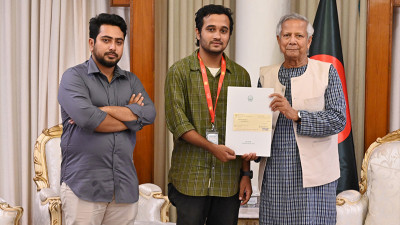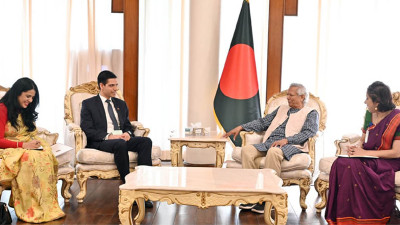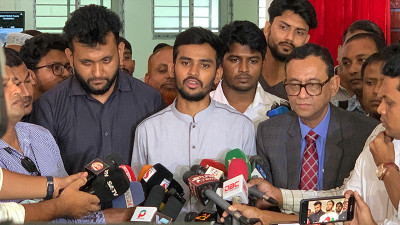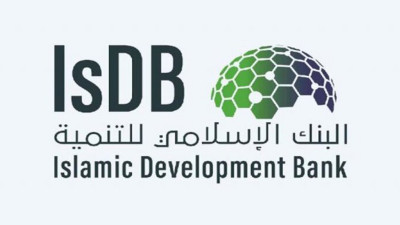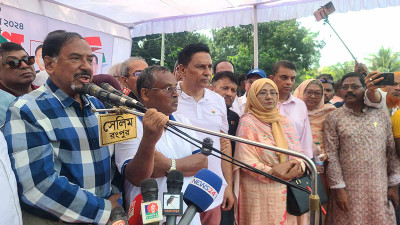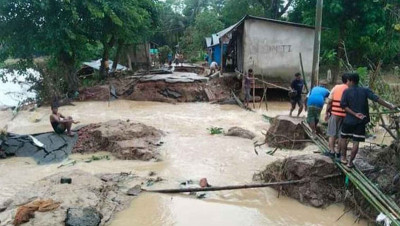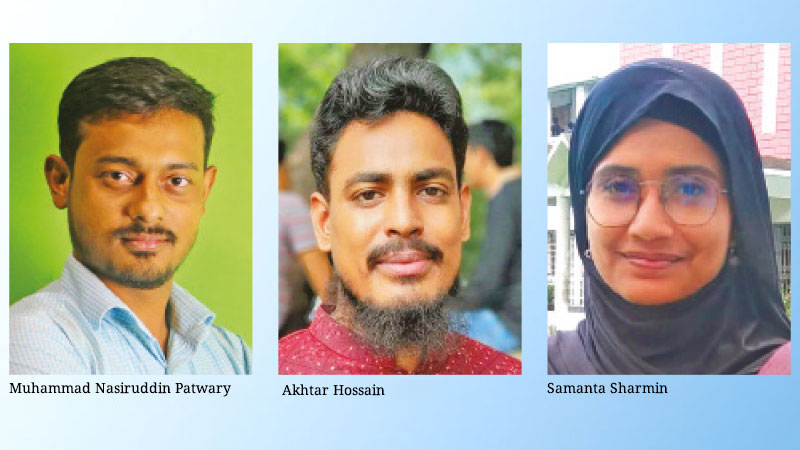 Photo: Bonik Barta
Photo: Bonik Barta A
55-member Jatiya Nagorik Committee was launched with the goal of dismantling
fascist systems and achieving success in ongoing political reforms. The
committee was officially announced yesterday (Sunday, September 8) afternoon at
the Central Shaheed Minar in Dhaka. Mohammad Nasiruddin Patwary has been named
as the committee’s convener, with Akhtar Hossain serving as the member
secretary.
Nasiruddin
Patwary previously worked as the political affairs member of the Liaison
Committee and was involved in the Student Federation’s politics. He also
briefly participated in the politics of the Amar Bangladesh Party.
Akhtar
Hossain, the member secretary, was the social service secretary of the Dhaka
University Central Students’ Union (DUCSU). He resigned from his role as vice
president of the central committee of the Student Rights Council, which led the
quota reform movement. Later, he became the convener of the ‘Gonotantrik
Chhatra Shakti’. Samanta Sharmin, the committee’s spokesperson, has led numerous
student rights movements.
Among
the committee members, Ariful Islam Adib is a former general secretary of the
Student Rights Council and currently holds a position in the Liaison Committee
overseeing media and information affairs. Akram Hossain, a former general
secretary of the Dhaka University branch of the Student Rights Council, now
works in the education and other affairs section of the Liaison Committee.
Another member, Anik Roy, served as the general secretary of the Student Union,
while Alik Mri represents the plainland indigenous communities, and Sayak
Chakma represents the hill tribes. Member Abu Rayhan Khan previously held the
position of general secretary of the Student Federation’s Dhaka University
branch. Member Saleh Uddin Sifat has long been outspoken against abuses related
to student dormitories at Dhaka University. Another member, Kaneta Ya Lam Lam,
was involved in the politics of the Student Wing of Bangladesh Nationalist
Party (BNP) and ran for DUCSU elections under their banner.
Other committee members include Saif Mostafiz, Monira Sharmeen, Nahida Sarwar Chowdhury, Sarwar Tusher, Mutasim Billah, Ashraf Uddin Mahdi, Alauddin Muhammad, Zabed Rashin, Md. Nijam Uddin, Sabhanaz Rashid Dia, Pranjal Costa, Mainul Islam Tuhin, Abdullah Al Amin, Hujaifa Ibne Umar, Srobona Shafiq Dipti, Sanjida Rahman Tuli, Mahmuda Alam Mitu, Shagufta Bushra Mishma, Syed Hasan Imtiaz, Tasnim Zara, Mohammad Miraj Mia, Md. Azhar Uddin Anik, Md. Mizbah Kamal, Ataullah, SM Shahriar, Manzur Al Matin, Pritom Das, Tasnuva Zabin, Arpita Shyma Deb, Mazharul Islam Fakir, Mushfiq us Salehin, Tahsin Reaz, Hasan Ali Khan, Md. Abdul Ahad, Faisal Mahmud Shanto, Moshiur Rahman, Atik Mujahid, Tanzil Mahmud, Abdullah Al Mamun Faisal, Md. Farhad Alam Bhuiyan, SM Suja, Md. Arifur Rahman, Syeda Akhter, Shorna Akhter, and Salman Muhammad Muqtadir.
Convener
Nasiruddin Patwary said, “The committee will work together to eradicate
dictatorship in Bangladesh following a mass uprising. We, along with the
students and citizens, will resist both domestic and foreign conspiracies. We
seek the cooperation of all journalists, intellectuals, and students at every
level for this cause.”
Member
Secretary Akhtar Hossain added, “The people of Bangladesh have been liberated
from dictatorship through the mass uprising of students and citizens. This
National Citizens’ Committee has been formed to establish justice and build a
better Bangladesh.”
The
committee outlined eight primary objectives, including upholding the collective
will and democratic aspirations reflected in the recent student-citizen
uprising, ensuring justice for those involved in brutal killings, collaborating
with an interim government to implement necessary reforms, and working towards
the unification of citizens at all levels through social, cultural, and
political initiatives.
Further
goals include continuing resistance against fascist forces, organizing
dialogues with diverse groups, including expatriate Bangladeshis, and
developing policies for restructuring state institutions. The committee also
plans to organize a Constituent Assembly and hold a referendum to draft a new
democratic constitution.
In
a press release, the National Citizens’ Committee stated that it has begun
working as a convening committee. It will soon engage with social, cultural,
religious, and professional leaders, as well as people from all walks of life,
to expand its influence at the grassroots level and work towards restructuring
the state.

